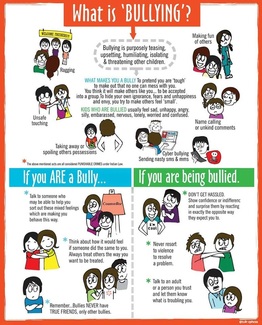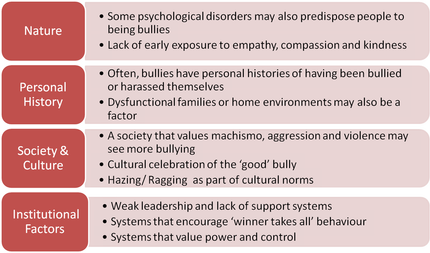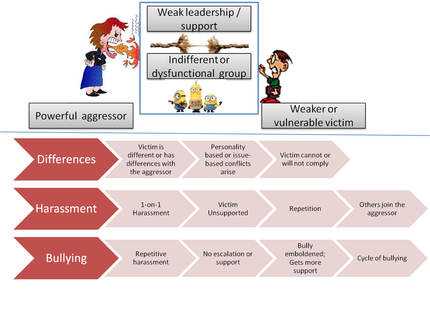Understanding and overcoming bullying

Bullying is not necessarily a matter of physical intimidation, where the big bully overpowers the small, the weak and the meek. Bullying can come in multiple forms of ill-treatment, and is the repeated exposure of one person to physical and/or emotional aggression including teasing, name calling, mockery, threats, harassment, taunting, hazing, social exclusion or rumours.
Often times, especially with emotional aggression, it is not one aggressor but a whole group of aggressors, and mute spectators that participate in the bullying of one or a few targets.
As children, many of us go through bullying - often both as a bully and as the bullied.
Often times, parents, families or those supposed to care for the children, allow the bullying to happen with the intent that the child will learn to cope with it, that their natural abilities will assert themselves and that the child will learn to survive. The 'real' world, they reason, is a tough world and one needs to learn to deal with bullies.
The reality is that the real world is tough because we let too many bullies and bullied people graduate into it without being challenged, and the behaviour continues well into adulthood, in their workplaces, relationships and in the families they create, making for a vicious cycle of bullying.
Often times, especially with emotional aggression, it is not one aggressor but a whole group of aggressors, and mute spectators that participate in the bullying of one or a few targets.
As children, many of us go through bullying - often both as a bully and as the bullied.
Often times, parents, families or those supposed to care for the children, allow the bullying to happen with the intent that the child will learn to cope with it, that their natural abilities will assert themselves and that the child will learn to survive. The 'real' world, they reason, is a tough world and one needs to learn to deal with bullies.
The reality is that the real world is tough because we let too many bullies and bullied people graduate into it without being challenged, and the behaviour continues well into adulthood, in their workplaces, relationships and in the families they create, making for a vicious cycle of bullying.
What happens because of bullying?
Bullying has its impact on everyone involved: the bullied, the bully and the by-standers.
Being the object of bullying can take a heavy toll on the bullied person. It saps one's sense of self, including belief in one's competence, safety and motivation. This reflects in the person's general well-being, and can be seen in loss of appetite and energy, loss of sleep and loss of motivation. The impact is visible as a drop in performance, disinterest in social and professional activities, increased cynicism, fear and anxiety. It might lead to dropping out, depression and health complaints. In extreme situations, the bullied may also self-harm or contemplate/ commit suicide. Even when the bullied person manages to exit the situation, it might leave a longer-term mental health impact, including post-traumatic stress, difficulties in inter-personal relationships, persistent fear and anxiety and other issues.
For the bully, while in the immediate term there may be the illusion of power and its rewards, often it creates difficulties in forming and maintaining relationships. Bullies in school often don't develop adult coping skills, and find themselves resorting to violence and further bullying, which might lead them to criminal behaviour and its consequences. Often, they find themselves growing into social isolation as well.
Bystanders who have allowed the bullying to continue face their guilt. Fear of being bullied themselves might lead to unhelpful choices, and such persistent behaviour which is in-congruent with their own thoughts and feelings can lead to a negative self-assessment, feelings of worthlessness and tendencies to compensate for it in some other way. Bystanders sense of guilt may also lead them to feeling depressed.
There clearly are no winners in bullying.
Being the object of bullying can take a heavy toll on the bullied person. It saps one's sense of self, including belief in one's competence, safety and motivation. This reflects in the person's general well-being, and can be seen in loss of appetite and energy, loss of sleep and loss of motivation. The impact is visible as a drop in performance, disinterest in social and professional activities, increased cynicism, fear and anxiety. It might lead to dropping out, depression and health complaints. In extreme situations, the bullied may also self-harm or contemplate/ commit suicide. Even when the bullied person manages to exit the situation, it might leave a longer-term mental health impact, including post-traumatic stress, difficulties in inter-personal relationships, persistent fear and anxiety and other issues.
For the bully, while in the immediate term there may be the illusion of power and its rewards, often it creates difficulties in forming and maintaining relationships. Bullies in school often don't develop adult coping skills, and find themselves resorting to violence and further bullying, which might lead them to criminal behaviour and its consequences. Often, they find themselves growing into social isolation as well.
Bystanders who have allowed the bullying to continue face their guilt. Fear of being bullied themselves might lead to unhelpful choices, and such persistent behaviour which is in-congruent with their own thoughts and feelings can lead to a negative self-assessment, feelings of worthlessness and tendencies to compensate for it in some other way. Bystanders sense of guilt may also lead them to feeling depressed.
There clearly are no winners in bullying.
What do you do if bullied?If you are being harassed for being who you are, then the first thing to know and tell yourself that you are not at fault. You are not in any way inviting it or asking for it. Don't blame yourself.
Recognize it for what it is - bullying. Name it. Just being able to call it out for what it is is empowering. It helps you make a psychological boundary between what is happening to you, and your own sense of who you are. Then, see what resources are available for you. Walking away is one. Talking to someone you trust is another. Strengthen yourself - check if this has had any impact on your physical or mental health, and see what you can do for yourself. Then, check if reporting is an option. You can hold your environment (school/ office/ institution) responsible for your safety. Look to see if others have been bullied as well. Connect if you can. Expose the bully for the bully they are, if that is an option. Remember: You and your health are your priority. Check any instinct for immediate justice or revenge, which might just keep you in a cycle of victim-aggressor with the bully. |
Are you being a bully?Some times, we don't recognize ourselves as being bullies. We tell ourselves we are being forceful or being really, really assertive. Maybe we tell ourselves being leaders or managers is a tough job - we are here to get the job done, not win a Miss Congeniality contest.
Here are a few questions:
|
Cyber/ virtual bullying
Cyber-bullying is as vicious and hurtful, sometimes even more so given that the virtual space might make it more accessible to exhibit bullying behaviour for people who may otherwise not have access to the bullied person, or may not have as much power in the real world. With technology being what it is, and how things can go viral in a largely unsupervised virtual world, real and made-up/ morphed material can quickly harm a person, and may be much harder to undo.
Keeping a watch on access to networks, ensuring privacy of information online, and keeping a balance between real and virtual lives are important starting points.
Keeping a watch on access to networks, ensuring privacy of information online, and keeping a balance between real and virtual lives are important starting points.
When should you seek help |
If you are finding yourself bullied and are at a loss as to what to do, please reach out. It helps to talk to someone to regain your sense of self, and reconnect with your resilient and competent self.
If you fear you have become a bully and don't like it about yourself, or if you have felt helpless in a situation where others were bullied, or if you have had a history of bullying, do reach out. Talking through what's been going on and connecting back with who you want to be can help heal. More Information |
|
1. US Department of Health & Human Services: Stop Bullying
2. UK NSPC on bullying signs, symptoms and effects 3 BBC Interactive's guide on bullying 4. Forbes on Are you a bully 5. NoBullying: An independent website against bullying |


